Tag: scholarly communication
Event: Affordable Course Content Workshops
Friday, Dec. 8
Open Textbook Workshop – Faculty & Lecturers
9:30-11:30 a.m. | Academic Innovation Studio, 117 Dwinelle Hall
Are you an instructor who is concerned about the impact of high textbook costs on your students? Are you considering adopting or creating innovative pedagogical materials? Explore possible open textbook solutions by attending a two hour workshop and writing a short textbook review. The Library will provide you with a $200 stipend for your efforts! Space is limited, so please submit a very brief application form:
http://bit.ly/facultyOpenTextwkshp
Friday, Dec. 8
Open Textbook Workshop – Staff & Campus Partners
12:45 p.m. – 2:45 p.m. | Academic Innovation Studio, 117 Dwinelle Hall
Register http://bit.ly/openwkshpcampuspartners
Are you a UC Berkeley staff or affiliate who is concerned about the impact of high textbook costs on students, or you are working with a faculty member who is? Do you want to support the adoption or creation of innovative pedagogical materials? Learn the landscape, opportunities, and challenges for open textbooks, and how to discuss whether open textbooks are a good fit.
Tuesday, Feb. 20
Publish Digital Books and Open Textbooks with Pressbooks
1:10-2:30 p.m. | Academic Innovation Studio, Dwinelle Hall 117 (Level D)
Register http://bit.ly/0220pressbooks
If you’re looking to self-publish work of any length and want an easy-to-use tool that offers a high degree of customization, allows flexibility with publishing formats (EPUB, MOBI, PDF), and provides web-hosting options, Pressbooks may be great for you. Pressbooks is often the tool of choice for academics creating digital books, open textbooks, and open educational resources, since you can license your materials for reuse however you desire. Learn why and how to use Pressbooks for publishing your original books or course materials. You’ll leave the workshop with a project already under way!
Discover Affordable Course Content and Open Textbook Options in Workshop Series
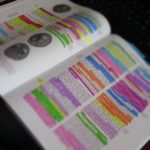 Concerned about the impact of high textbook and course reader costs on students? Interested in discovering pedagogically rich and innovative solutions? Consider attending the below workshops to understand the landscape for rising course content expenses, and what you can do to both lower students’ expenditures and improve their educational experience. If you have any questions, please feel free to contact schol-comm@berkeley.edu. We hope to see you there!
Concerned about the impact of high textbook and course reader costs on students? Interested in discovering pedagogically rich and innovative solutions? Consider attending the below workshops to understand the landscape for rising course content expenses, and what you can do to both lower students’ expenditures and improve their educational experience. If you have any questions, please feel free to contact schol-comm@berkeley.edu. We hope to see you there!
Friday, Oct. 27
Making Textbooks and Course Readers Affordable
11 a.m.-12:30 p.m. | Wurster Hall, Environmental Design Library
Register http://bit.ly/1027ACC
Do you wonder how to make your assigned readings more affordable, and how much time and effort you’d need to invest? The University Library and Center for Teaching and Learning have partnered in an innovative pilot program to reduce course content expenses and incentivize the creation of high quality, free, and open course materials. In this panel event, you’ll hear from participating faculty and lecturers who will discuss their experiences and provide practical tips from the leading edge of course content affordability. Refreshments will be provided.
Friday, Dec. 8
Open Textbook Workshop – Faculty & Lecturers
9:30 a.m. – 11:30 a.m. | Academic Innovation Studio, 127 Dwinelle Hall
Apply http://bit.ly/facultyOpenTextwkshp
Are you an instructor who is concerned about the impact of high textbook costs on your students? Do you want to adopt or create innovative pedagogical materials? Explore possible open textbook solutions by attending a two hour workshop and writing a short textbook review. The Library will provide you with a $200 stipend for your efforts! Space is limited, so please submit a very brief application form: http://bit.ly/facultyOpenTextwkshp
Friday, Dec. 8
Open Textbook Workshop – Staff & Campus Partners
12:45 p.m. – 2:45 p.m. | Academic Innovation Studio, 127 Dwinelle Hall
Register http://bit.ly/openwkshpcampuspartners
Are you a UC Berkeley staff or affiliate who is concerned about the impact of high textbook costs on students, or you are working with a faculty member who is? Do you want to support the adoption or creation of innovative pedagogical materials? Learn the landscape, opportunities, and challenges for adopting and creating open textbooks, and how to discuss whether open textbooks are a good fit.
Tuesday, Feb. 20
Publish Digital Books and Open Textbooks with Pressbooks
1:10-2:30 p.m. | Academic Innovation Studio, Dwinelle Hall 117 (Level D)
Register http://bit.ly/0220pressbooks
If you’re looking to self-publish work of any length and want an easy-to-use tool that offers a high degree of customization, allows flexibility with publishing formats (EPUB, MOBI, PDF), and provides web-hosting options, Pressbooks may be great for you. Pressbooks is often the tool of choice for academics creating digital books, open textbooks, and open educational resources, since you can license your materials for reuse however you desire. Learn why and how to use Pressbooks for publishing your original books or course materials. You’ll leave the workshop with a project already under way!
Boost Your Scholarly Publishing Skills During Open Access Week, Oct. 23-27

Open Access connects your scholarship to the world, and helps you gain global readership. For the week of Oct. 23-27, the UC Berkeley Library is highlighting these connections.
You can attend five exciting workshops and panels that bridge real-world scholarly publishing skills with the connectedness that open access offers.
What’s Open Access?
Open Access (OA) is the free, immediate, online availability of scholarship. Often, OA scholarship is also free of accompanying copyright or licensing reuse restrictions, promoting further innovation. OA removes barriers between readers and scholarly publications—connecting readers to information, and scholars to emerging scholarship and other authors with whom they can collaborate, or whose work they can test, innovate with, and expand upon.
Open Access Week @ UC Berkeley
OA Week 2017 is a global effort to bring attention to the connections that OA makes possible. At UC Berkeley, the University Library—with participation from partners like the Graduate Division, California Digital Library, Center for Teaching & Learning and more—has put together engaging programming demonstrating OA’s connections in action. We hope to see you at the events, where you can continue to build your scholarly publishing skills.
Schedule
Refreshments provided at all events, and attendance enters you into raffle for prizes! To find out more about each event, please visit our Scholarly Communication Events page.
Monday, Oct. 23
Copyright and Your Dissertation
1-2:30 p.m. | 309 Sproul Hall
Register http://bit.ly/1023copyright
From the beginning of the writing process to submitting and publishing your dissertation or thesis, we will walk you through a useful workflow for addressing copyright and other legal considerations.
Tuesday, Oct. 24
First Books & Publishing Your Dissertation
2-3:30 p.m. | 309 Sproul Hall
Register http://bit.ly/1024publishing
Hear from expert panelists about what happens once you submit your dissertation, how to shape your dissertation’s impact, and how to go about publishing your first book.
Wednesday, Oct. 25
Increasing and Monitoring Scholarly Impact
10-11:30 a.m. | 309 Sproul Hall
Register http://bit.ly/1025impact
Discover strategies and tips for preparing and promoting your scholarship, and the best ways to monitor and increase your citations and success. You’ll also learn how to: understand metrics, select and use scholarly networking tools, choose reputable open access journals and publishing options, and participate in open access article and book funding opportunities.
Thursday, Oct. 26
Understanding the (Changing) Realm of Peer Review
1-2:30 p.m. | 309 Sproul Hall
Register http://bit.ly/1026understandpeer
Are you publishing an article or reviewing someone else’s work? Panelists demystify the peer review process, what’s expected of you and what you’ll experience, and how the world of peer review is evolving with new models that foster transparency and impact.
Friday, Oct. 27
Making Textbooks and Course Readers Affordable
11 a.m.-12:30 p.m. | Wurster Hall, Environmental Design Library
Register http://bit.ly/1027ACC
Do you wonder how to make your assigned readings more affordable, and how much time and effort you’d need to invest? The University Library and Center for Teaching and Learning have partnered in an innovative pilot program to reduce course content expenses and incentivize the creation of high quality, free, and open course materials. In this panel event, you’ll hear from participating faculty and lecturers who will discuss their experiences and provide practical tips from the leading edge of course content affordability.
We hope to see you there!
Questions? E-mail schol-comm@berkeley.edu, or check out our Scholarly Communication Services website.
Free textbooks? Effort aims to take some financial burden off students’ shoulders
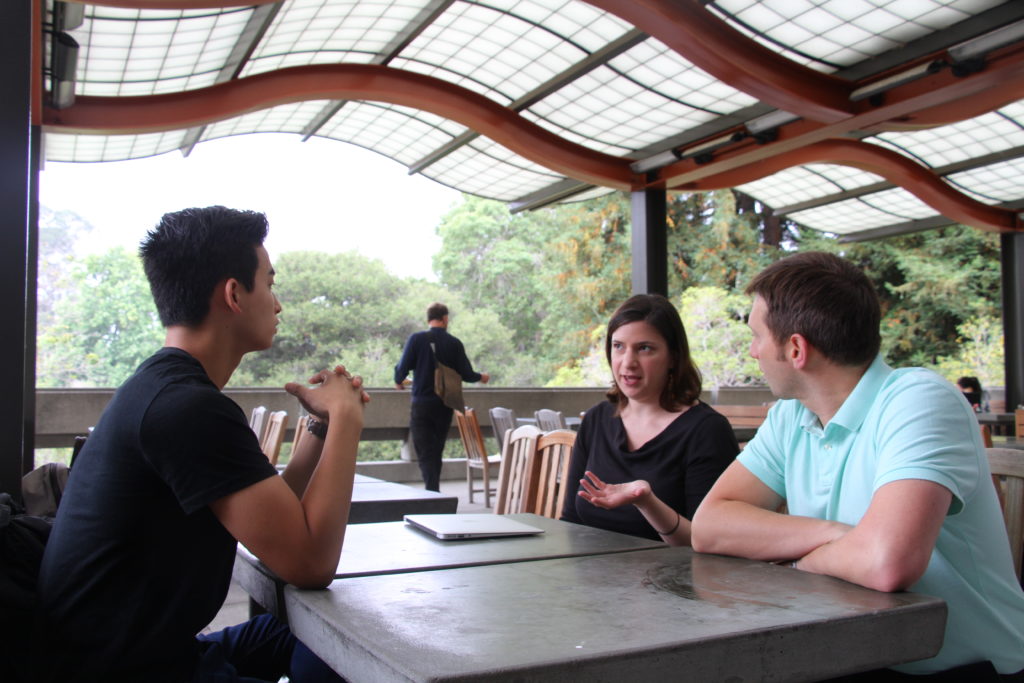
Going to college ain’t cheap, what with tuition, room and the ubiquitous yet mysteriously named board. (Does anyone know what that last one actually means?)
If that weren’t enough, the cost of course materials have soared to sky-high levels. Textbook prices have risen 88 percent in the past decade, according to a 2016 Bureau of Labor Statistics report. And with undergrads here expecting to pay about $900 — a low figure for some — on books and materials this academic year, students are shouldering a large burden.
“This is something that every major university is grappling with,” says Rachael Samberg, scholarly communication officer at the University Library at UC Berkeley, who is directing a cross-campus effort to provide students with free and openly available course materials starting this fall.
The pilot programs, with support from the Arcadia Fund, are broken into three parts: providing free course packs — the often hefty sheafs of assigned readings that students are usually expected to pay for; paying professors to switch to free digital versions of their books; and supplying grants for the creation of new, openly accessible course texts.
The first two — the free course packs and the digital versions of course materials — are available starting this semester, and the new course materials — referred to as open educational resources — will be available this spring or next fall.
More than 20 classes, with subjects ranging from economics to earthquakes and class sizes ranging from 15 to 350 students, are part of the pilots.
Daniel A. Rodríguez, a professor of city and regional planning who arrived at UC Berkeley last year, is familiar with the concept of free class materials for students. Previously, when he was working at the University of North Carolina at Chapel Hill, he took it upon himself to scan readings and make them freely available as PDFs for his students.
Expecting students to pay $300 for a course pack, he said, was “unconscionable.”
So when an email popped into his inbox asking if he was interested in the pilot, it was a no-brainer.
“This was just a much more institutionalized and easy way to do it,” he said.
This year, instead of each student paying a total of $150 for a roughly 600-page course pack, students in Rodríguez’s undergraduate course, called Sustainable Mobility, will have access to online readings.
The cost for students to access the materials? Free.
“(This is) a very, very welcome outcome,” he said.
In addition to providing students with free course materials, and professors with grants totaling roughly $25,000 to make it all possible, the initiative provides fair use counseling to professors who choose to participate, which eliminates the fee — which is passed on to students — that commercial copy centers charge to legally clear the material they’re reproducing.
Based on the findings from the pilots, the project team will provide recommendations about the next steps to achieve broader reach across campus.
Regardless of what lies ahead, the pilot programs alone have a potential impact that reaches far beyond Berkeley, Samberg said.
The creation of new course materials, for example, offers a chance to provide students with cutting-edge, and even interactive, textbooks, and those materials will be available to anyone wishing to access or download them from around the world for years to come.
“We’ve got the innovation on campus to take (ideas) and make them a reality to benefit a global community,” Samberg said.
Academic Council Affirms Commitment to Open Access Efforts like OA2020
By letter to University of California President Janet Napolitano, the Academic Council has enthusiastically endorsed and affirmed university-wide commitments to make UC research and scholarship as freely and openly available as possible.
The letter of the Academic Council, which advises the UC President on behalf of the Assembly, updates President Napolitano on various campus efforts to fulfill the University’s mission of providing long-term societal benefits through transmitting advanced knowledge. As the Council notes, one way that the University has been working to achieve its mission is through implementation of the 2013 Open Access policy, pursuant to which UC scholars widely disseminate their scholarship by making copies available open access (OA). OA promotes free, immediate access to research articles and the rights to use these articles to advance knowledge worldwide.
“As the nation’s largest public research institution and a source of two percent of the world’s research literature,” explains Jim Chalfant, Academic Council Chair, “the University of California is uniquely positioned to further this goal for the benefit of people all over the world who currently do not have access to the vast majority of scholarly research articles.”
Indeed, since the adoption of the 2013 OA policy, the ten UC campuses have made important progress toward increasing both the dissemination and impact of UC scholarship while reducing barriers to readership.
One way in which the Berkeley campus has contributed to a more open scholarly landscape is by engaging in open access initiatives such as OA2020, noted in particular in the Council’s letter. OA2020 is an international movement, led by the Max Planck Digital Library in Munich, to convert the entire corpus of scholarly journal literature to open access by the year 2020. The OA2020 movement intends to accomplish this “flipping” by encouraging institutions to convert resources currently spent on journal subscriptions into funds that support sustainable OA business models. Berkeley signed the OA2020 Expression of Interest in March 2017 along with UC Davis and UCSF.
In affirming UC Berkeley, UC Davis, and UCSF’s participation in OA2020 and similar initiatives, the Academic Council avows OA2020’s alignment with both the 2013 OA policy and the UC’s mission to conduct research in the public interest and serve society. Accordingly, both the Council and the Academic Senate’s Committee on Library and Scholarly Communication “support all efforts by UC campuses to promote open access to scholarly research, both in the service of the University’s Open Access mission and in the service of similarly-oriented global missions such as OA2020.”
To learn more about why UC Berkeley, UC Davis, and UCSF signed the OA2020 Expression of interest, please see our joint statement, Why OA2020? (attached as Appendix C to the Academic Council’s letter), or our website, OA2020.us.
To discover more about the many initiatives in which the UC Berkeley Library engages to advance progress toward sustainable open access publishing, please see our Scholarly Communication Services page about our Open Access Initiatives.
We warmly welcome opportunities to talk more about these efforts, so please feel free to reach out to us: schol-comm@berkeley.edu.
Freedom to Marry Oral History Project
The Freedom to Marry Oral History Project
In the historically swift span of roughly twenty years, support for the freedom to marry for same-sex couples went from an idea a small portion of Americans agreed with to a cause supported by virtually all segments of the population. In 1996, when Gallup conducted its first poll on the question, a seemingly insurmountable 68% of Americans opposed the extension of marriage rights. In a historic reversal, fewer than twenty years later several polls found that over 60% of Americans had come to support the freedom to marry nationwide. The rapid increase in support mirrored the progress in securing the right to marry coast to coast. Before 2004, no state issued marriage licenses to same-sex couples. By spring 2015, thirty-seven states affirmed the freedom to marry for same-sex couples, with a number of states extending marriage through votes in state legislatures or at the ballot box. The discriminatory federal Defense of Marriage Act, passed in 1996, denied legally married same-sex couples the federal protections and responsibilities afforded married different-sex couples—a double-standard corrected when a core portion of the act was overturned by the U.S. Supreme Court in 2013 in United States v. Windsor. The full national resolution came in June 2015 when, in Obergefell v. Hodges, the U.S. Supreme Court ruled that the Constitution’s guarantee of the fundamental right to marry applies equally to same-sex couples.
The Oral History Center is thrilled to release to the public the first major oral history project documenting the vast shift in public opinion about marriage, the consequential reconsideration of our nation’s laws governing marriage, and the actions of individuals and organizations largely responsible for these changes. The Freedom to Marry Oral History Project produced 23 interviews totaling nearly 100 hours of recordings. Interviewees include: Evan Wolfson, founder of Freedom to Marry; Kate Kendell, executive director of the National Center for Lesbian Rights; James Esseks, director of the ACLU’s LGBT & HIV project; and Thalia Zepatos, the movement’s “message guru” who worked at Freedom to Marry as director of research and messaging. Read on for video clips of the interviews and links to complete interview transcripts.
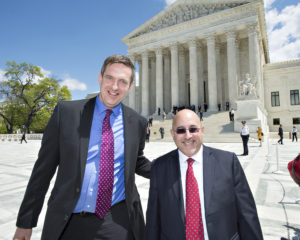
At the center of the effort to change hearts and minds, prevail in the courts and legislatures, win at the ballot, and win at the Supreme Court was Freedom to Marry, the national campaign launched by Harvard-trained attorney Evan Wolfson in 2003. Freedom to Marry’s national strategy focused from the beginning on setting the stage for a nationwide victory at the Supreme Court. Working with national and state organizations and allied individuals and organizations, Freedom to Marry succeeded in building a critical mass of states where same-sex couples could marry and a critical mass of public support in favor of the freedom to marry. This oral history project focuses on the pivotal role played by Freedom to Marry and their closest state and national organizational partners, as they drove the winning strategy and inspired, grew, and leveraged the work of a multitudinous movement.
Freedom to Marry Oral History Project Interview Transcripts:
Barbara Cox, “Barbara Cox on Marriage Law and the Governance of Freedom to Marry.”
Michael Crawford, “Michael Crawford on the Digital Campaign at Freedom to Marry.”
Scott Davenport, “Scott Davenport on Administration and Operations at Freedom to Marry.”
Jo Deutsch, “Jo Deutsch and the Federal Campaign.”
Sean Eldridge, “Sean Eldridge on Politics, Communications, and the Freedom to Marry.”
James Esseks, “James Esseks on the Legal Strategy, the ACLU, and LGBT Legal Organizations.”
Harry Knox, “Harry Knox on the Early Years of Freedom to Marry.”
Matt McTighe, “Matt McTighe on the Marriage Campaigns in Massachusetts and Maine.”
Amy Mello, “Amy Mello and Field Organizing in Freedom to Marry.” (forthcoming)
John Newsome, “John Newsome on And Marriage for All.”
Kevin Nix, “Kevin Nix on Media and Public Relations in the Freedom to Marry Movement.”
Bill Smith, “Bill Smith on Political Operations in the Fight to Win the Freedom to Marry.”
Marc Solomon, “Marc Solomon on Politics and Political Organizing in the Freedom to Marry Movement.” (forthcoming)
Tim Sweeney, “Tim Sweeney on Foundations and the Freedom to Marry Movement.”
Cameron Tolle, “Cameron Tolle on the Digital Campaign at Freedom to Marry.”
Thomas Wheatley, “Thomas Wheatley on Field Organizing with Freedom to Marry.”
Evan Wolfson, “Evan Wolfson on the Leadership of the Freedom to Marry Movement.”
Thalia Zepatos, “Thalia Zepatos on Research and Messaging in Freedom to Marry.”

Professor Susan Ervin-Tripp: 2016 Class of ’31 Interviewee in University History
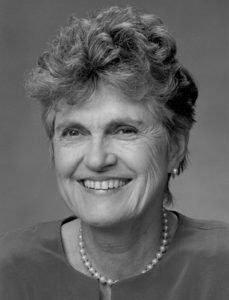
One of the great joys of being an oral historian is getting to talk to people you otherwise wouldn’t have known. We have the privilege of asking people about their lives, putting their experiences in context of the larger historical landscape, posing questions that others don’t have the opportunity to ask. I had the opportunity to do just this when I interviewed Professor Susan Ervin-Tripp in 2016.
Professor Dan Slobin puts it best in the introduction he wrote for Ervin-Tripp’s oral history:
Throughout her long and productive career, Susan Ervin-Tripp has repeatedly been a path-breaker. And the paths that she helped explore have become well-traveled roads. I is remarkable to see so many innovations in one life story: psycholinguistics and sociolinguistics, embracing new directions in the study of first-language acquisition as well as bilingualism; repeated applications of new technology: computers, tape recorders, video recorders, wireless microphones; design of new methods of transcribing and documenting the many layers of speech interaction; cross-linguistic and cross-cultural research, with attention to both individual and interpersonal dimensions of language. Along with these contributions to the scientific side of her profession, Ervin-Tripp has given equal attention to the institutional and political dimensions of academia, focusing on the treatment of women and minorities. Wherever possible, she used her academic skills as a psycho- and sociolinguist to provide a scientific foundation to her advocacy.
Slobin is not the only one who values Ervin-Tripp’s many contributions. Her interview was part of our Class of ’31 series, in which faculty and staff, both current and retired, are nominated by admirers to the subject an oral history. Ervin-Tripp received numerous, passionate nominations which conveyed a resounding eagerness to document her work in academics and equity, knowing that we could all benefit from learning about her trailblazing work.
I sat down with Ervin-Tripp for our first interview in May of 2016. It was immediately clear that she was a practiced speaker, having taught for many years, with a healthy sense of humor. She was poised and articulate, prepared with her notes. Over the course of our six hours of interviews, we discussed her childhood during the Great Depression in Minneapolis, Minnesota, her undergraduate education at Vassar College, her doctoral work at the University of Michigan, and her career at UC Berkeley, which began in 1958. She detailed her work on the Southwest Project in Comparative Psycholinguistics studying the connection between language and cognitive performance, her time as a professor in the Psychology and Speech Departments at Berkeley, her early adoption of technology in her research, her participation at Stanford University’s Center for Advanced Studies in the Behavioral Sciences and with the 1985 Scientific Exchange program in France. She talked about the significant advances that she made for women’s equality on campus and the multiple efforts she made to create such change.
It was a pleasure to have interviewed a woman whose career has impacted Berkeley so greatly. There are many lessons to learn from this interview, particularly the courage and persistence it takes to create an equitable environment. Professor Susan Ervin-Tripp’s oral history is one that is rare for her generation and one that should be celebrated.
Shanna Farrell, Interviewer, Oral History Center
Library Statement on Commitment to Free and Open Information, Scholarship, and Knowledge Exchange

Global Knowledge Exchange
This post originally appeared on the University of California Office of Scholarly Communication‘s blog, March 6, 2017.
The University of California Office of Scholarly Communication (OSC) and the University of California Libraries issue the following statement in response to recent actions by the new federal administration and in order to address resulting concerns about continued open access to and preservation of information, scholarship, and knowledge.
The unfettered exchange and careful preservation of information are fundamental to democracy, progress, and intellectual freedom. The critical research and scholarship conducted by government entities and academic institutions worldwide safeguard and support human rights, public health, the environment, artistic and literary enterprise, scientific and technological innovation, and much more. This scholarship is critical for informed discourse and policy development throughout society. As such, the fruits of governmental and scholarly research—the data and documentation generated and released—must remain publicly available and must not be suppressed, endangered, or altered to serve political ends.
To encourage broad dissemination of research and scholarship, the faculty of the University of California and the UC President have implemented open access policies that echo many of the open data and scholarship mandates adopted by the federal government. Recognizing that open access to research increases scientific, scholarly, and critical knowledge, the UC system has committed, via these policies, to making all UC scholarly articles widely and freely accessible, regardless of access restrictions elsewhere. Now more than ever, UC faculty and staff’s participation in these open access policies is fundamental to ensuring persistent, unfettered access to valuable data and research.
OSC and the UC Libraries are working to protect public access to government data and research in the event that the original sources for these materials should be compromised. In the coming weeks, OSC and librarians on each of the UC campuses will identify specific actions to be taken to ensure that research data, publications, and scholarship remain accessible and discoverable. These efforts are not intended to supplant the authoritative sources for government data, publications, and information. Rather, we are working to make certain that these materials remain shielded from inappropriate political influence or suppression.
We support similar information rescue and preservation efforts taking place around the country and encourage other institutions to join in this commitment. We look forward to seeing statements from our peer institutions (and encourage any who wish to borrow or adapt ours), and we welcome opportunities to work with these institutions on projects supporting access to and preservation of the scholarly record. In particular, we offer our collaboration to those working in disciplines or within organizations facing new threats.
In the meantime, we wish to underscore our commitment to advocating not only for researchers and authors at UC campuses, but also for scholars and readers worldwide, and to emphasize our dedication to ensuring information access as an essential public good. We will continue to champion these professional and democratic values and to challenge any policies or practices that levy obstacles to intellectual exchange.
Great talks and tips in Love Your Data Week 2017
Opening out #LYD17 w/great discussion of #securing research data. Thanks to our experts speakers @UCBIDS @DH @DLabAtBerkeley @ucberkeleylib pic.twitter.com/DqvIKb9sDL
— Yasmina Anwar (@yasmina_anwar) February 14, 2017
This week, the University Library and the Research Data Management program were delighted to participate in the Love Your Data (LYD) Week campaign by hosting a series of workshops designed to help researchers, data specialists, and librarians to better address and plan for research data needs. The workshops covered issues related to managing, securing, publishing, and licensing data. Participants from many campus groups (e.g., LBNL, CSS-IT) were eager to continue the stimulating conversation around data management. Check out the full program and information about the presented topics.
Photographs by Yasmin AlNoamany for the University Library.
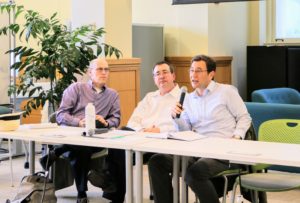
The first day of LYD week at UC Berkeley was kicked off by a discussion panel about Securing Research Data, featuring
Jon Stiles (D-Lab, Federal Statistical RDC), Jesse Rothstein (Public Policy and Economics, IRLE), Carl Mason (Demography). The discussion centered upon the rewards and challenges of supporting groundbreaking research when the underlying research data is sensitive or restricted. In a lively debate, various social science researchers detailed their experiences working with sensitive research data and highlighted what has worked and what has proved difficult.
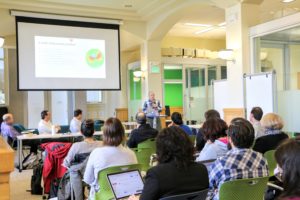
At the end, Chris Hoffman, the Program Director of the Research Data Management program, described a campus-wide project about Securing Research Data. Hoffman said the goals of the project are to improve guidance for researchers, benchmark other institutions’ services, and assess the demand and make recommendations to campus. Hoffman asked the attendees for their input about the services that the campus provides.
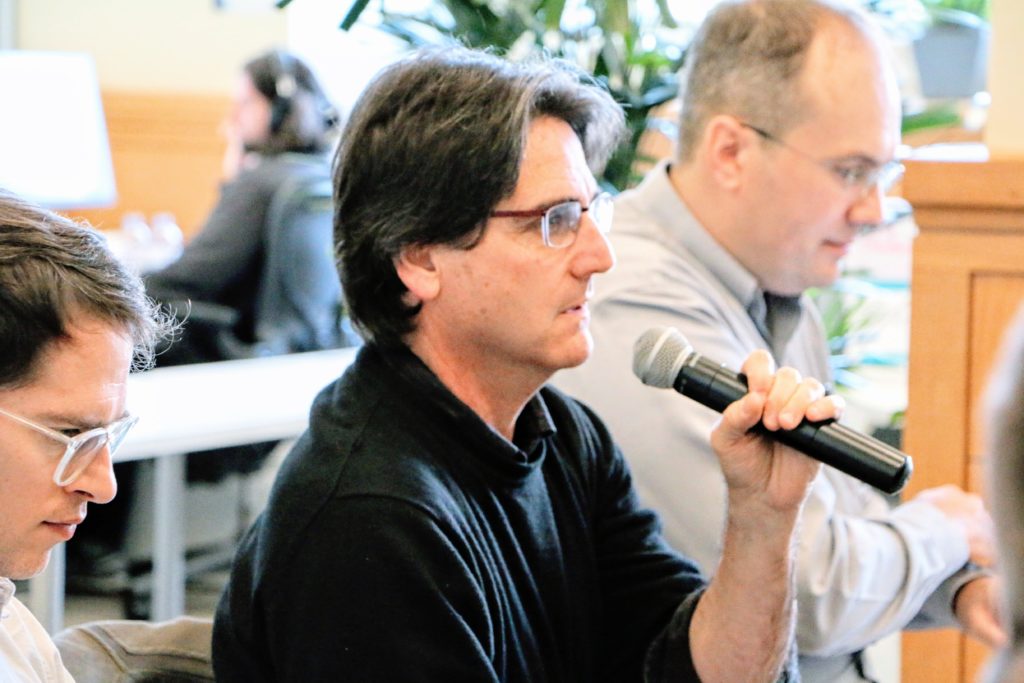
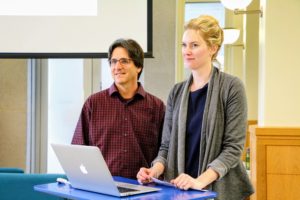
On the second day, we hosted a workshop about the best practices for using Box and bDrive to manage documents, files and other digital assets by Rick Jaffe (Research IT) and Anna Sackmann (UC Berkeley Library). The workshop covered multiple issues about using Box and bDrive such as the key characteristics, and personal and collaborative use features and tools (including control permissions, special purpose accounts, pushing and retrieving files, and more). The workshop also covered the difference between the commercial and campus (enterprise) versions of Box and Drive. Check out the RDM Tools and Tips: Box and Drive presentation.
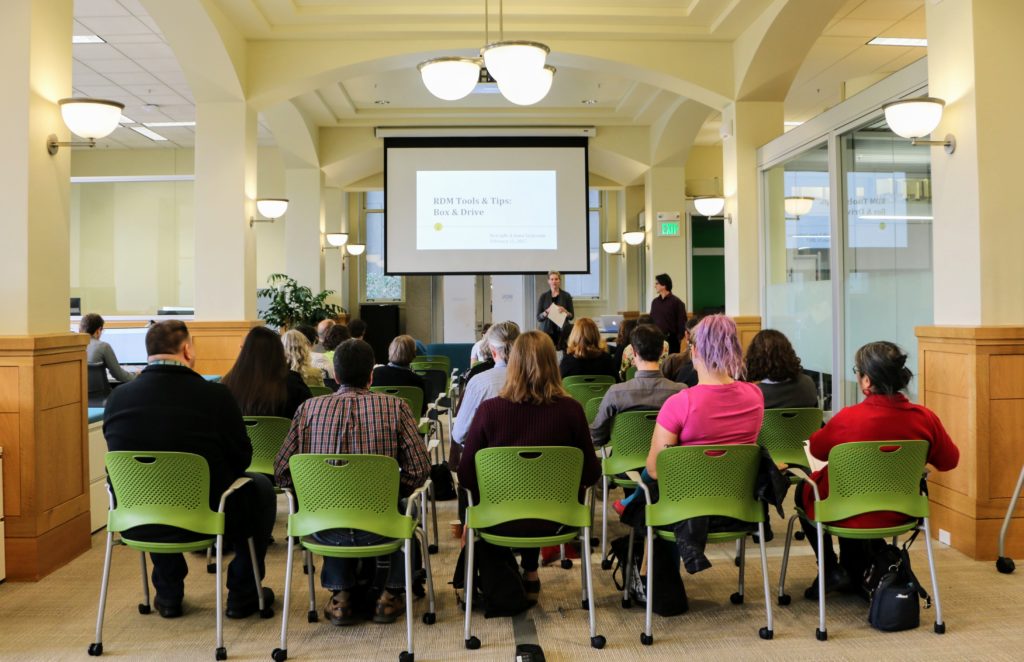
We closed out LYD Week 2017 at UC Berkeley with a workshop about Research Data Publishing and Licensing 101. In the workshop, Anna Sackmann and Rachael Samberg (UC Berkeley’s Scholarly Communication Officer) shared practical tips about why, where, and how to publish and license your research data. (You can also read Samberg & Sackmann’s related blog post about research data publishing and licensing.)
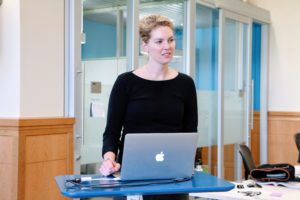
In the first part of the workshop, Anna Sackmann talked about reasons to publish and share research data on both practical and theoretical levels. She discussed relevant data repositories that UC Berkeley and other entities offer, and provided criteria for selecting a repository. Check out Anna Sackmann’s presentation about Data Publishing.
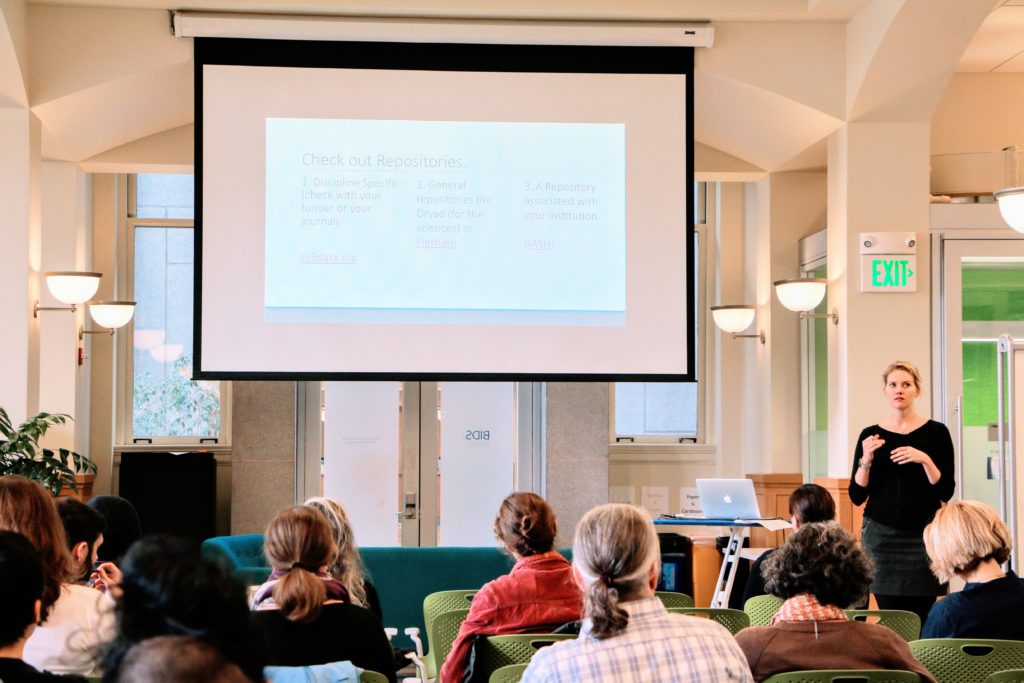
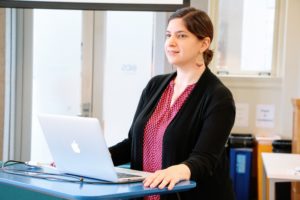
During the second part of the presentation, Rachael Samberg illustrated the importance of licensing data for reuse and how the agreements researchers enter into and copyright affects licensing rights and choices. She also distinguished between data attribution and licensing. Samberg mentioned that data licensing helps resolve ambiguity about permissions to use data sets and incentivizes others to reuse and cite data. At the end, Samberg explained how people can license their data and advised UC Berkeley workshop participants to contact her with any questions about data licensing.
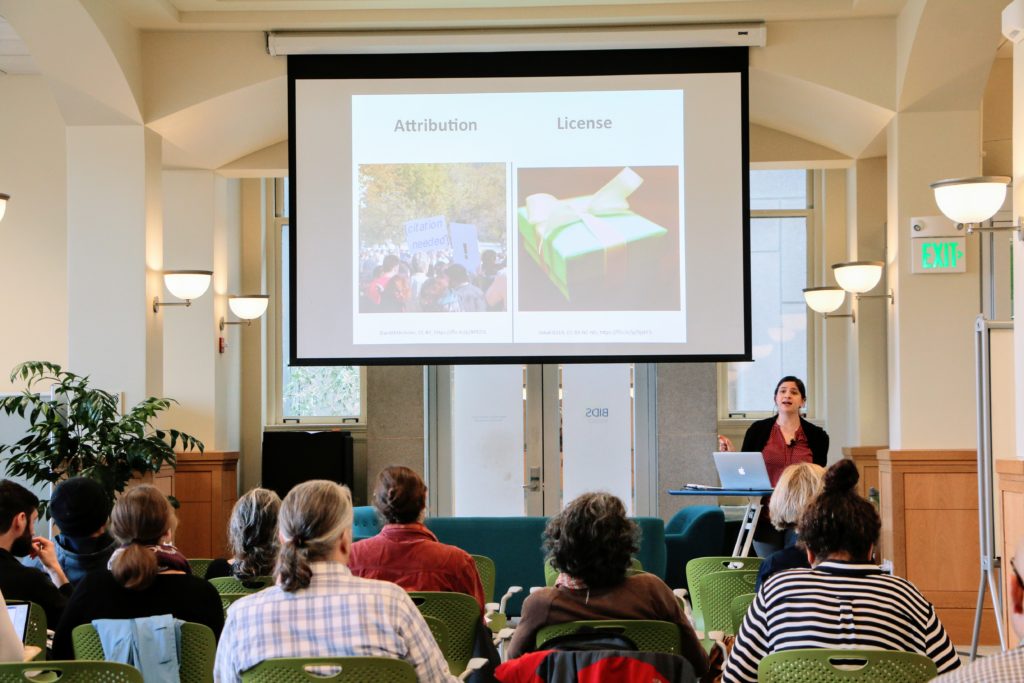
Check out the slides from Rachael Samberg’s presentation about data licensing below.
The workshops received positive feedback from the attendees. Attendees also expressed their interest in having similar workshops to understand the broader perspectives and skills needed to help researchers manage their data.
—
Yasmin AlNoamany
Special thanks to Rachael Samberg for editing this post.
UC Berkeley Open Access Authors: We’re Celebrating You!
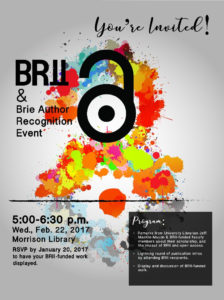
Join faculty, students, and colleagues for wine and cheese as the UC Berkeley community recognizes and discusses UCB open access papers at the BRII & Brie Author Recognition Event (open to all) being held in Morrison Library on Feb. 22, 2017 from 5:00-6:30 p.m.
We’re Celebrating Because You’ve Published For Impact
You’re over the moon because your new paper has just been accepted to a high-impact journal that is published open access—free, digital, and available to anyone online. You chose this journal because open access (OA) publishing can promote increased readership by lowering access barriers, and can spur innovation through fewer restrictions on use.
But suddenly you’re faced with a quandary: There’s a steep fee to make all this happen—an “article processing charge” (APC), typically somewhere between $650-$3,500, that authors are asked to provide to publishers for OA publication in lieu of typical print-subscription fees paid for by libraries. You want people to read and cite your scholarship, and you hope to advance knowledge by enabling maximal use of your scholarly output. But how can you finance and participate in this new scholarly publishing landscape?
One option is to deposit a copy of the article you submitted into a repository, in keeping with the UC system’s OA policy. (For more on the OA policy, see the UCOP Office of Scholarly Communication’s helpful guide.) To that end, UC scholars and staff can deposit pre-print copies of their publications in eScholarship (the repository created by California Digital Library), or can choose a discipline-specific repository like arXiv or the new Humanities Commons.
Depositing preprints and making them available at no cost to the public in this fashion can have remarkable impacts for building knowledge and augmenting your academic reputation. Yet, there is still one other parameter of an APC-based OA publishing system that remains to be addressed: covering the APC, itself. What can you do when an esteemed open access journal like BMC Biology asks you to provide $2,785 to publish your accepted paper in their online journal? Maybe you have grant funds to cover this APC, but maybe you don’t, and maybe you don’t have a grant at all.
What’s The Solution?
UC Berkeley’s Library can help, and we’re about to start celebrating that. The Berkeley Research Impact Initiative (BRII) makes APC funding available to UC Berkeley authors (current faculty members, post-docs, students, researchers) and publishers (campus Centers, Organized Research Units, and Departments) to make your publications free to all readers immediately upon publication—thereby also helping to increase the impact of your scholarship.
Started in 2008, BRII has provided around $400,000 of funding for several hundred articles and publications across numerous discipline areas. In a 2016 paper, authors Teplitzky and Phillips reported that 89% of responding BRII recipients agreed that the availability of BRII to help pay the APC or open access fee for their article affected their decision about where to publish, and 44% had not published an open access article prior to the one funded by BRII. Most respondents (82%) believed their article had a greater impact overall because it was OA.
Let’s Celebrate UC Berkeley Scholarship!
So, it’s high time to recognize the scholarship of BRII-funded authors, and raise awareness about available BRII funding. That’s exactly what the Library will be doing with the BRII & Brie Author Recognition Event (open to all) being held in Morrison Library on Feb. 22, 2017 from 5:00-6:30 p.m.
You can hear remarks from University Librarian Jeff MacKie-Mason and BRII-funded faculty members about their scholarship, and the impact of BRII and open access. There will also be a lightning round of paper discussions by attending BRII recipients, so you can learn more about the OA scholarship being created here at UC Berkeley. BRII-funded works will also be displayed, so if you already are a BRII recipient, please RSVP by January 20 to have your work shown at the event.
We hope you’ll join us to celebrate your colleagues in an evening of learning and author recognition. If you know little about OA or BRII, but aspire to publish, please join us to find out more about this important funding program. RSVP here!